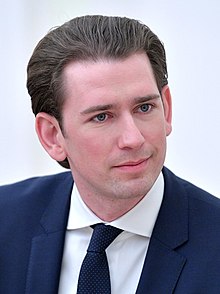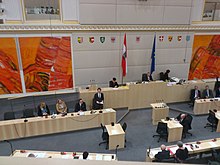Sebastian Kurz
Sebastian Kurz | |
|---|---|
 | |
| 25th Chancellor of Austria | |
| Assumed office 18 December 2017 | |
| President | Alexander Van der Bellen |
| Deputy | Heinz-Christian Strache |
| Preceded by | Christian Kern |
| Chairman of the People's Party | |
| Assumed office 15 May 2017 | |
| Secretary-General | Karl Nehammer |
| Preceded by | Reinhold Mitterlehner |
| Chair of the Organization for Security and Co-operation in Europe | |
| In office 1 January 2017 – 18 December 2017 | |
| Preceded by | Frank Walter Steinmeier |
| Succeeded by | Karin Kneissl |
| Minister of Foreign Affairs | |
| In office 16 December 2013 – 18 December 2017 | |
| Chancellor | Werner Faymann Christian Kern |
| Preceded by | Michael Spindelegger |
| Succeeded by | Karin Kneissl |
| Personal details | |
| Born | 27 August 1986 Vienna, Austria |
| Political party | People's Party |
| Domestic partner | Susanne Thier[1] |
| Education | University of Vienna |
| Signature |  |
Sebastian Kurz (German pronunciation: [zeˈbastˌi̯a:n ˈkʊrt͡s]; born 27 August 1986) is an Austrian politician (ÖVP) serving as Chancellor of Austria since 18 December 2017 and Chairman of the Austrian People's Party since 15 May 2017. From 2014 to 2017 he was Austria's minister for Europe, integration and foreign affairs.
Following the 2017 legislative elections, Kurz became the youngest head of government in the world, at the age of 31. He was surpassed in April 2018 by Matteo Ciacci, Captain-Regent of San Marino, who is 27.
Early life and education
Kurz was born in Vienna, the only child[2] of Roman Catholic parents Josef and Elisabeth Kurz. His father is an engineer and his mother is a grammar school teacher.[3] His maternal grandmother Magdalena Müller, born in Temerin in 1928, is a Danube Swabian who could only speak Hungarian, and who fled from Vojvodina in former Yugoslavia to Austria during World War II.[4][5][6]
He was brought up in the Meidling district, where he still lives. He took his A levels in 2004 and then completed compulsory military service. In 2005, he began studying law at the University of Vienna,[7][8] but later dropped out to focus on his political career.[9][10]
Political career
Youth branch and parliament
In 2009 Kurz was elected chairman of the youth branch of the Austrian People's Party. Between 2010 and 2011 he was a member of Vienna's city council, where he focused on generational fairness and ensuring pensions.[11] In April 2011, he was appointed to the newly created post of State Secretary for Integration (part of the Ministry of the Interior).[12]
In the 2013 general election, Kurz was elected as a member of parliament, winning the most direct votes of any member of parliament in the election.[13]
Foreign Minister of Austria (2013–2017)

In December 2013, Kurz became Austria's foreign minister, whose portfolio at his own request was widened to include social integration. At the time of his swearing-in Kurz was Austria's youngest government minister since the foundation of the republic and the youngest foreign minister in the world[14].
His first trip abroad took Kurz to Croatia, marking the continuous Austrian support for that country's accession to the European Union.[15] In February 2014, he hosted the first of several rounds of negotiations on the nuclear program of Iran in Vienna, strengthening Austria's position as a place of dialogue.[citation needed]
The negotiations were successfully concluded on 14 July 2015, when the Joint Comprehensive Plan of Action was signed by Iran, the P5+1 and the European Union. Following the signature Sebastian Kurz said he was pleased with the outcome of the talks with Iran, and expressed his hope that “the Vienna Agreement will act as catalyst towards the global nuclear disarmament ambitions”.[16]
During his first year in office, Kurz chaired the Committee of Ministers of the Council of Europe until May 2014.[17]
In May 2014, as Chairman of the Committee of Ministers of the Council of Europe, Sebastian Kurz invited 30 ministers of foreign affairs, among them Russian Foreign Minister Sergey Lavrov and his Ukrainian colleague Andrii Deshchytsia, to Vienna in order to negotiate solutions to end the Ukrainian crisis.[18]

As part of the Humanitarian Initiative, Kurz hosted the Vienna Conference on the Humanitarian Impact of Nuclear Weapons in late 2014.[19] Following his proposal, Vienna later hosted the negotiations leading to the Joint Comprehensive Plan of Action for the nuclear program of Iran in 2015.[citation needed]
In November 2014, Sebastian Kurz was appointed to lead the European People's Party foreign affairs ministers together with Elmar Brok, chair of the Foreign Affairs Committee in the EP.[20][21]

In the course of the European migrant crisis in 2015, Kurz called for a more effective control of the EU external borders[22] and presented a 50-point plan towards integration with special focus on the areas language and education, labour and job market, rule of law and values.[23]
In 2015, Kurz proposed a new Islam law prohibiting the funding of mosques by entities from abroad, paying imams' salaries, and regulating the version of the Quran that may be used in Austria.[24] The law provides Muslims with additional rights, such as the right to halal food and pastoral care in the military. Kurz said the changes were intended to "clearly combat" the influence of radical Islam in Austria.[25] The law passed by the Austrian parliament in February 2015 did not call for an authorized version of the Quran.[26]
Amid the Turkish government purge against members of its own civil and military service in reaction to a failed coup d'état in July 2016, Kurz summoned Turkey's ambassador to explain Ankara's links to demonstrations of thousands of people in Austria in support of Turkish president Recep Tayyip Erdoğan.[27]
Chairman of the Austrian People's Party (2017–present)
Kurz was appointed acting party leader after former head Reinhold Mitterlehner stepped down in May 2017. He was later formally elected chairman, receiving 98.7 percent of the votes at a party convention in Linz. The delegates approved changes to the party statute, which put more power in the party leader’s hands, including the power to set party policy, the power to appoint party ministers, and the power to name candidates to stand for election.[28]

Chancellorship
Kurz's party won a plurality of seats in the 2017 legislative election.[29] On 20 October, President Alexander van der Bellen officially asked Kurz to make suggestions about the formation of a new government.[30] On 18 December the new coalition government was sworn in with Sebastian Kurz as Chancellor and Heinz-Christian Strache, chairman of the Freedom Party as vice chancellor.[31]
Chancellor Kurz has, in many aspects, brought Austria closer to the Visegrád Group (V4), particularly the Eurosceptic and right-wing populist governments of Mateusz Morawiecki in Poland, Viktor Orbán in Hungary, and Miloš Zeman in the Czech Republic. Although he ruled out Austria joining the bloc of Central European nations, Kurz has said Austria could serve as a bridge between Western and Central European nations within the European Union.[32] His government realized several convergences with Visegrad, namely in their common strong opposition to the asylum-seeker quota system.
Other activities
- Austrian Development Agency, Chairman of the Advisory Council on Development Policy[33]
- Austrian Society for China Studies (ÖGCF), Member of the Board of Trustees
- General Settlement Fund for Victims of National Socialism, Ex-Officio Member of the Board of Trustees[34]
- Political Academy of the Austrian People's Party, President (since 2015)
- European Council on Foreign Relations (ECFR), Member
References
- ^ "Sie will keine Brigitte Macron sein". Süddeutsche Zeitung. 16 October 2017.
{{cite web}}: Italic or bold markup not allowed in:|publisher=(help) - ^ "Trauen Sie sich alles zu, Herr Kurz?" (in German). Krone. 17 December 2013.
- ^ "So lange dauert es noch bis zu den Nationalratswahlen 2017:" (in German). Kleine Zeitung.
- ^ "Wie Flüchtlinge Sebastian Kurz' Kindheit prägten". welt.de. Die Welt. Retrieved 23 February 2018.
- ^ "Sebastian Kurz hat Wurzeln am Balkan". Heute.
- ^ Miler, Stevan (23 Jan 2018). "Sebastian Kurz' Großmutter stammt aus einem Städtchen in der Vojvodina [Sebastian Kurz's grandmother is from a town in Vojvodina]". Kosmo (in German). Vienna: Twist Zeitschriften Verlag GmbH. Retrieved 20 March 2018.
- ^ "Curriculum Vitae". The Federal Minister for Europe, Integration and Foreign Affairs. Federal Ministry for Europe, Integration and Foreign Affairs, Republic of Austria. Retrieved 5 December 2017.
- ^ "Wer ist wer (who is who)". Sebastian Kurz (in German). Parliament, Republic of Austria. Retrieved 5 December 2017.
- ^ "Der Außenminister, der sich mit der Türkei anlegt". Stern. 2016-08-16. Retrieved 2017-12-24.
- ^ Tobias Rapp (2017-05-26). "Ein Mann, ein Programm". Spiegel Online. Retrieved 2017-12-24.
- ^ Michael Shields (17 December 2013), Kurz, 27, puts fresh face on Austrian foreign policy Reuters.
- ^ "Sebastian Kurz: "Goldene Löffel hatte ich nie im Mund"" [Sebastian Kurz: "I never had golden spoons in my mouth"] (in German). Die Presse. 23 April 2011. Retrieved 16 October 2017.
- ^ Michael Shields (17 December 2013), Kurz, 27, puts fresh face on Austrian foreign policy Reuters.
- ^ Harris, Chris (16 October 2017). "Sebastian Kurz: the man set to become the world's youngest national leader". Eusronews. Retrieved 21 December 2017.
{{cite news}}: Cite has empty unknown parameter:|dead-url=(help) - ^ "Youngest Ever Foreign Minister Starts With Croatia Visit". Croatiaweek. 20 December 2013.
- ^ "Kurz: Vienna Agreement with Iran is important for global peace and security". Austrian Federal Ministry for Europe, Integration, and Foreign Affairs. 14 July 2015.
- ^ “The Council of Europe appeal to Russia to engage dialogue with Ukraine should be heard", says Austrian Foreign Minister Kurz Council of Europe, 7 April 2014.
- ^ "124th Session of the Committee of Ministers (Vienna, 5-6 May 2014) Composition of Delegations". Council of Europe. 5 May 2014.
- ^ Fredrik Dahl (8 December 2014), U.S., UK face nuclear disarmament pressure at Vienna meeting Reuters.
- ^ "Austrian Minister Sebastian Kurz appointed to lead EPP Foreign Affairs Ministerial Meeting together with Elmar Brok, Chair of Foreign Affairs Committee in the EP". MEP Elmar Brok. 18 November 2015.
- ^ Austrian Minister Sebastian Kurz appointed to lead EPP Foreign Affairs Ministerial Meeting together with Elmar Brok, Chair of Foreign Affairs Committee in the EP European People’s Party, 17 November 2014.
- ^ "EU refugee policy helps people smugglers, says Austria". Financial Times. 4 November 2015.
- ^ "50 points towards successful integration". Austrian Federal Ministry for Europe, Integration and Foreign Affairs. 19 November 2015.
- ^ Muslims in this country allowed only German language Qurans, Reuters, 28 February 2015, retrieved 15 October 2017 – via India Today
- ^ Elahe Izadi (February 26, 2015), "Austria is taking controversial steps to tighten a 100-year-old 'Law on Islam'", The Washington Post, retrieved 15 October 2017
- ^ "Austria passes controversial reforms to Islam law banning foreign funding". The Daily Telegraph. 25 February 2015. Retrieved 17 October 2017.
- ^ Shadia Nasralla (July 21, 2016), Austria summons Turkish ambassador over pro-Erdogan demonstrations Reuters.
- ^ "A 30-year-old party leader is trying to remake Austria". The Economist. 3 June 2017. Retrieved 17 October 2017.
- ^ "Austria: Sebastian Kurz opens talks with Freedom Party". BBC News. 24 October 2017. Retrieved 24 October 2017.
- ^ "Sebastian Kurz asked to form Austrian government". Politico. 20 October 2017. Retrieved 24 October 2017.
- ^ Eddy, Melissa (2017-12-18). "Austria's New Government: A Mix of Far-Right, Pro-Europe and Youth". The New York Times. ISSN 0362-4331. Retrieved 2017-12-25.
- ^ Alexe, Dan (1 February 2018). "Kurz and Orban want to clip Brussels' power, but Austria will not join Visegrad Four". New Europe. Retrieved 2 February 2018.
- ^ New-constitution of Advisory Council on Development Policy: Make development cooperation a concern of the broad public Austrian Development Agency, press release of 18 February 2015.
- ^ Board of Trustees, General Settlement Fund for Victims of National Socialism.

